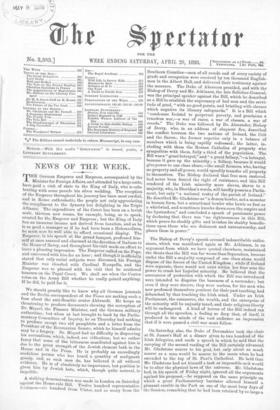A striking demonstration was made in London on Saturday against
the Home-rule Bill. Twelve hundred representative Irishmen—six hundred from Ulster, and as many from the Southern Counties—men of all creeds and of every variety of grade and occupation were received by ten thousand English- men in the Albert Hall, and delivered their testimony against the measure. The Duke of Abercorn presided, and with the Bishop of Derry and Mr. Atkinson, the late Solicitor-General, was the principal speaker against the Bill, which he described as a Bill to establish the supremacy of bad men and the servi- tude of good, " with no good points, and bristling with clauses which negative its illusory safeguards." It is a Bill which "condemns Irelald to perpetual poverty, and proclaims a traceless war,---a war of races, a war of classes, a war of creeds." The Duke was followed by Dr. Alexander, Bishop of Derry, who, in an address of eloquent fire, described the conflict between the two nations of Ireland, the Colt and the Saxon ; the former superior only in a balance of numbers which is being rapidly redressed ; the latter, in- cluding with them the Roman Catholics of property who sympathise with them, fully a third of the population. The Bill was a " great betrayal," and " a great fallacy,"—a betrayal, because it gave up the minority ; a fallacy, because it would give power to one class alone,—the small farmers, who, having no property and all power, would speedily transfer all property to themselves. The Bishop declared that free men enslaved had never been denied the right of resistance, and this Bill rendered of the Irish minority mere slaves, slaves to a majority, who, in Sheridan's words, will hardly possess a Parlia- ment, but only "a national vestry of the parish of Ireland." He described Mr. Gladstone as " a demon bowler, not a monster in human form, but a sensational bowler who bowls as feet as a whirlwind, and sometimes knocks down even the umpire and the bystanders," and concluded a speech of passionate power by declaring that there was "no righteousness in this Bill, which pours its shoddy gifts and lavishes its shabby benedic- tions upon those who are dishonest and untrustworthy, and places them in power."


















































 Previous page
Previous page